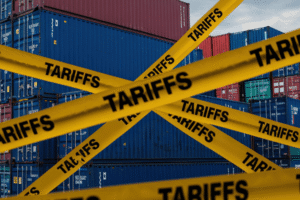
The Government Should Play a More Productive Role in the Success of American Female Founders
Sali Christeson, founder and CEO of the women’s workwear brand Argent, wasn’t tuned in when President Trump unveiled his “Liberation Day” tariffs April 2, but it didn’t take long for the news to hit her text messages with the same jolt that shook the global stock market.
Navigating the Trump administration’s tariffs—a campaign trail threat framed as retaliation against other countries and “medicine” for the United States—has proven more difficult, with little advance warning and tangled global supply chains to reassess.
“The government should play a more productive role in our success. They should not take away from our ability to thrive,” says Ms. Christeson.
Brands like Argent—independent and women-led—stand to lose significantly as major fashion sourcing regions face extensive taxes whenever tariffs go into effect. Tariffs are paid by the importing company, not the country from which the goods originated.
With the United States importing approximately 98 percent of clothing and 99 percent of shoes, according to the Business of Fashion, every corner of the industry will pay up in one way or another. Most likely, by raising prices for consumers, whether or not the designers want it to happen.
Many women-owned and women-led companies refer to the tariffs as a ‘tipping point’ for the growth of their businesses because they don’t have the fat profit margins like big players do nor the capital. Hence, boot-strapped brands are hurting.
Find out how women are navigating through the tariff turbulence by cautiously raising prices and cutting costs when and where they can.




